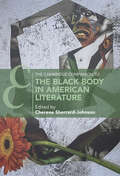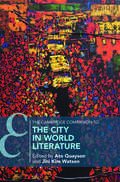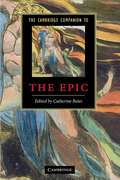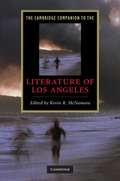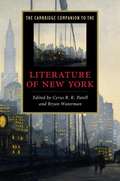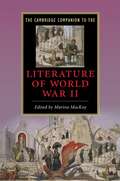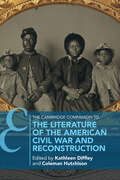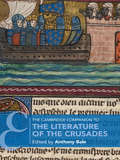- Table View
- List View
The Cambridge Companion to the Black Body in American Literature (Cambridge Companions to Literature)
by Cherene Sherrard-JohnsonWhether invisible or hyper-visible, adored or reviled, from the inception of American literature the Black body has been rendered in myriad forms. This volume tracks and uncovers the Black body as a persistent presence and absence in American literature. It provides an invaluable guide for teachers and students interested in literary and artistic representations of Blackness and embodiment. The book is divided into three sections that highlight Black embodiment through conceptual flashpoints that emphasize various aspects of human body in its visual and textual manifestations. This Companion engages past and continuing debates about the nature of embodiment by showcasing how writers from multiple eras and communities defined and challenged the limits of what constitutes a body in relation to human and nonhuman environment.
The Cambridge Companion to the Bloomsbury Group
by Victoria RosnerNamed after a small neighborhood in London where its members settled as young adults, the Bloomsbury Group produced an impressive body of work that yielded British Post-Impressionist painting, literary modernism, the field of macroeconomics, and a new direction for public taste in art. This Companion offers a comprehensive guide to the intellectual and social contexts surrounding Bloomsbury and its coterie, which includes writer Virginia Woolf, economist Maynard Keynes, and art critic Roger Fry, among others. Thirteen chapters from leading scholars and critics explore the Bloomsbury Group's rejection of Victorian values and social mores, their interventions in issues of empire and international politics, their innovations in the literary and visual arts, and more. Complete with a chronology of key events and a detailed guide to further reading, this Companion provides scholars and students of English literature with fresh perspectives on the achievements of this remarkable circle of friends.
The Cambridge Companion to the City in Literature
by Kevin R. McnamaraFrom the myths and legends that fashioned the identities of ancient city-states to the diversity of literary performance in contemporary cities around the world, literature and the city are inseparably entwined. The international team of scholars in this volume offers a comprehensive, accessible survey of the literary city, exploring the myriad cities that authors create and the genres in which cities appear. Early chapters consider the literary legacies of historical and symbolic cities from antiquity to the early modern period. Subsequent chapters consider the importance of literature to the rise of the urban public sphere; the affective experience of city life; the interplay of the urban landscape and memory; the form of the literary city and its responsiveness to social, cultural and technological change; dystopian, nocturnal, pastoral and sublime cities; cities shaped by colonialism and postcolonialism; and the cities of economic, sexual, cultural and linguistic outsiders.
The Cambridge Companion to the City in World Literature (Cambridge Companions to Literature)
by Ato Quayson Jini Kim WatsonThis book forges new ground in the relationship between cities and World Literature. Through a series of essays spanning a variety of metropolises, it shows how cities have given rise to key aesthetic dispositions, acts of linguistic and cultural translation, topographic conceptualizations, global imaginaries, and narratives of self-fashioning that are central to understanding World Literature and its debates. Alongside an introduction and three theoretical chapters, each chapter focuses on a particular city in the Global North or Global South, and brings World Literary debates—on translation, literary networks, imperial and migrant imaginaries, centers and peripheries—into conversation with the urban literary histories of Beijing, Bombay/Mumbai, Dublin, Cairo, Istanbul, Johannesburg, Lagos, London, Mexico City, Moscow and St Petersburg, New York, Paris, Singapore, and Sydney.
The Cambridge Companion to the Classic Russian Novel
by Malcolm V. Jones Robin Feuer MillerMany Russian novels of the nineteenth and twentieth centuries have made a huge impact, not only inside the boundaries of their own country but across the western world. The Cambridge Companion to the Classic Russian Novel offers a thematic account of these novels, in fourteen newly-commissioned essays by prominent European and North American scholars. There are chapters on the city, the countryside, politics, satire, religion, psychology, philosophy; the romantic, realist and modernist traditions; and technique, gender and theory. In this context the work of Pushkin, Dostoevsky, Tolstoy, Turgenev, Bulgakov, Nabokov, Pasternak and Solzhenitsyn, among others, is described and discussed. There is a chronology and guide to further reading; all quotations are in English. This volume will be invaluable not only for students and scholars but for anyone interested in the Russian novel.
The Cambridge Companion to the Eighteenth-Century Novel
by John RichettiThis multifaceted picture of the British novel in its formative decades provides an indispensable guide for students of the eighteenth-century novel, and its place within the culture of its time. Drawing on new research in social and political history, the twelve contributors to this Companion challenge and refine the traditional view of the novel's origins and purposes. Sentimental and Gothic fiction, and fiction by women, are discussed, alongside detailed readings of work by Defoe, Swift, Richardson, Henry Fielding, Sterne, Smollett and Burney.
The Cambridge Companion to the Epic
by Catherine BatesEvery great civilisation from the Bronze Age to the present day has produced epic poems. Epic poetry has always had a profound influence on other literary genres, including its own parody in the form of mock-epic. This Companion surveys over four thousand years of epic poetry from the Babylonian Epic of Gilgamesh to Derek Walcott's postcolonial Omeros. The list of epic poets analysed here includes some of the greatest writers in literary history in Europe and beyond: Homer, Virgil, Dante, Camões, Spenser, Milton, Wordsworth, Keats and Pound, among others. Each essay, by an expert in the field, pays close attention to the way these writers have intimately influenced one another to form a distinctive and cross-cultural literary tradition. Unique in its coverage of the vast scope of that tradition, this book is an essential companion for students of literature of all kinds and in all ages.
The Cambridge Companion to the Greek and Roman Novel
by Tim WhitmarshThe Greek and Roman novels of Petronius, Apuleius, Longus, Heliodorus and others have been cherished for millennia, but never more so than now. The Cambridge Companion to the Greek and Roman Novel contains nineteen original essays by an international cast of experts in the field. The emphasis is upon the critical interpretation of the texts within historical settings, both in antiquity and in the later generations that have been and continue to be inspired by them. All the central issues of current scholarship are addressed: sexuality, cultural identity, class, religion, politics, narrative, style, readership and much more. Four sections cover cultural context of the novels, their contents, literary form, and their reception in classical antiquity and beyond. Each chapter includes guidance on further reading. This collection will be essential for scholars and students, as well as for others who want an up-to-date, accessible introduction into this exhilarating material.
The Cambridge Companion to the Harlem Renaissance
by George HutchinsonThe Harlem Renaissance (1918–1937) was the most influential single movement in African American literary history. Its key figures include W. E. B. Du Bois, Nella Larsen, Zora Neale Hurston, Claude McKay, and Langston Hughes. The movement laid the groundwork for all later African American literature, and had an enormous impact on later black literature world-wide. With chapters by a wide range of well-known scholars, this 2007 Companion is an authoritative and engaging guide to the movement. It first discusses the historical contexts of the Harlem Renaissance, both national and international; then presents original discussions of a wide array of authors and texts; and finally treats the reputation of the movement in later years. Giving full play to the disagreements and differences that energized the renaissance, this Companion presents a set of new readings encouraging further exploration of this dynamic field.
The Cambridge Companion to the History of the Book
by Leslie HowsamThroughout human history, the world's knowledge and fruits of the creative imagination have been produced, circulated and received through the medium of the material text. This Companion provides a wide-ranging account of the history of the book and its ways of thinking about works from ancient inscription to contemporary e-books, discussing thematic, chronological and methodological aspects of this interdisciplinary field. The first part considers book cultures from local, national and global perspectives. Part two, organized around the dynamic relationship between the material book and the mutable text, develops a loosely chronological narrative from early writing, through manuscript and early printing, to the institution of a mechanized book trade, and on to the globalization of publishing and the introduction of the electronic book. A third part takes a practical turn, discussing methods, sources and approaches: bibliographical, archival and reading experience methodologies, as well as pedagogical strategies.
The Cambridge Companion to the Irish Novel
by John Wilson FosterThis is the perfect overview of the Irish novel from the seventeenth century to the present day.
The Cambridge Companion to the Italian Novel
by Peter Bondanella Andrea CiccarelliThis study provides a broad-ranging introduction to the major trends in the development of the Italian novel from its early modern origins to the contemporary era. It examines some of the most influential and important novelists of the twentieth century, such as Luigi Pirandello, Primo Levi, Umberto Eco and Italo Calvino. Readers will be exposed to the vitality of the Italian novel throughout its history, in addition to learning about the debates and criticism that have contributed to its development.
The Cambridge Companion to the Literature of Berlin
by Webber Andrew J.This collection of essays by international specialists in the literature of Berlin provides a lively and stimulating account of writing in and about the city in the modern period. The first eight chapters chart key chronological developments from 1750 to the present day, while subsequent chapters focus on Berlin drama and poetry in the twentieth century and explore a set of key identity questions: ethnicity/migration, gender (writing by women), and sexuality (queer writing). Each chapter provides an informative overview along with closer readings of exemplary texts. The volume is designed to be accessible for readers seeking an introduction to the literature of Berlin, while also providing new perspectives for those already familiar with the topic. With a particular focus on the turbulent twentieth century, the account of Berlin's literary production is set against broader cultural and political developments in one of the most fascinating of global cities.
The Cambridge Companion to the Literature of London
by Lawrence ManleyLondon has provided the setting and inspiration for a host of literary works in English, from canonical masterpieces to the popular and ephemeral. Drawing upon a variety of methods and materials, the essays in this volume explore the London of Langland and the Peasants' Rebellion, of Shakespeare and the Elizabethan stage, of Pepys and the Restoration coffee house, of Dickens and Victorian wealth and poverty, of Conrad and the Empire, of Woolf and the wartime Blitz, of Naipaul and postcolonial immigration, and of contemporary globalism. Contributions from historians, art historians, theorists and media specialists as well as leading literary scholars exemplify current approaches to genre, gender studies, book history, performance studies and urban studies. In showing how the tradition of English literature is shaped by representations of London, this volume also illuminates the relationship between the literary imagination and the society of one of the world's greatest cities.
The Cambridge Companion to the Literature of Los Angeles
by Kevin R. McnamaraLos Angeles has a tantalizing hold on the American imagination. Its self-magnifying myths encompass Hollywood glamour, Arcadian landscapes, and endless summer, but also the apocalyptic undertow of riots, environmental depredation, and natural disaster. This Companion traces the evolution of Los Angeles as the most public staging of the American Dream - and American nightmares. The expert contributors make exciting, innovative connections among the authors and texts inspired by the city, covering the early Spanish settlers, African American writers, the British and German expatriates of the 1930s and 1940s, Latino, and Asian LA literature. The genres discussed include crime novels, science fiction, Hollywood novels, literary responses to urban rebellion, the poetry scene, nature writing, and the most influential non-fiction accounts of the region. Diverse, vibrant, and challenging as the city itself, this Companion is the definitive guide to LA in literature.
The Cambridge Companion to the Literature of New York
by Cyrus R. K. Patell Bryan WatermanA portrait of the diverse literary cultures of the city from its beginnings as a Dutch colony to the present.
The Cambridge Companion to the Literature of Paris
by Anna-Louise MilneNo city more than Paris has had such a constant and deep association with the development of literary forms and cultural ideas. The idea of the city as a space of literary self-consciousness started to take hold in the sixteenth century. By 1620, where this volume begins, the first in a long line of extraordinary works of the human imagination, in which the city represented itself to itself, had begun to find form in print. This collection follows that process through to the present day. Beginning with the 'salon', followed by the hybrid culture of libertinage and the revolutionary hotbeds of working-class districts, it explores the continuities and changes between the pre-modern era and the nineteenth century, when Paris asserted itself as cultural capital of Europe. It goes on to explore how this vision of Paris as a key capital of modernity has shaped contemporary literature.
The Cambridge Companion to the Literature of World War II
by Marina MackayThe literature of World War II has emerged as an accomplished, moving, and challenging body of work, produced by writers as different as Norman Mailer and Virginia Woolf, Primo Levi and Ernest Hemingway, Jean-Paul Sartre and W. H. Auden. This Companion provides a comprehensive overview of the international literatures of the war: both those works that recorded or reflected experiences of the war as it happened, and those that tried to make sense of it afterwards. It surveys the writing produced in the major combatant nations (Britain and the Commonwealth, the USA, Japan, Germany, France, Italy, and the USSR), and explores its common themes. With its chronology and guide to further reading, it will be an invaluable source of information and inspiration for students and scholars of modern literature and war studies.
The Cambridge Companion to the Literature of the American Civil War and Reconstruction The Cambridge Companion to the Literature of the American Civil War and Reconstruction (Cambridge Companions to Literature)
by Kathleen Diffley Coleman HutchisonThe legacies of the Civil War and Reconstruction remain a central part of American life a century and a half later. Drawing together leading scholars in literary studies and history, this volume offers accessible treatments of major authors and genres of this period, including Walt Whitman, Frances Ellen Watkins Harper, Rebecca Harding Davis, Frederick Douglass, and Charles Chesnutt, as well as fiction, poetry, drama, and life-writing. Although focused on literature, this Companion also canvases battlefields, homefronts, and hospitals, and discusses a range of topics, including constitutional reform and presidential impeachment; emancipation and Africa; material culture and monuments; education, civil rights, and reenactment. The Cambridge Companion to the Literature of the American Civil War and Reconstruction speaks powerfully to literature's ability to help readers come to terms with a violent, oppressive history while also imagining a different future.
The Cambridge Companion to the Literature of the American South
by Sharon MonteithThis Companion maps the dynamic literary landscape of the American South. From pre- and post-Civil War literature to modernist and civil rights fictions, and writing by immigrants in the 'global' South of the late-twentieth and twenty-first centuries, these newly commissioned essays from leading scholars explore the region's established and emergent literary traditions. Touching on poetry and song, drama and screenwriting, key figures such as William Faulkner and Eudora Welty, and iconic texts such as Gone with the Wind, chapters investigate how issues of class, poverty, sexuality, and regional identity have textured Southern writing across generations. The volume's rich contextual approach highlights patterns and connections between writers while offering insight into the development of Southern literary criticism, making this Companion a valuable guide for students and teachers of American literature, American studies, and the history of storytelling in America.
The Cambridge Companion to the Literature of the Crusades: Volume 1 (Cambridge Companions to Literature)
by Anthony BaleHow were the Crusades, and the crusaders, narrated, described, and romanticised by the various communities that experienced or remembered them? This Companion provides a critical overview of the diverse and multilingual literary output connected with crusading over the last millennium, from the first writings which sought to understand and report on what was happening, to contemporary medievalism, in which crusading is a potent image of holy war and jihad. The chapters show the enduring legacy of the crusaders' imagery, from the chansons de geste to Walter Scott, from Charlemagne to Orlando Bloom. Whilst the crusaders' hold on Jerusalem was relatively short-lived, the desire for Jerusalem has had a long afterlife in many cultural contexts and media.
The Cambridge Companion to the Literature of the First World War
by Vincent SherryThe Great War of 1914-1918 marked a turning point in modern history and culture. This Companion offers critical overviews of the major literary genres and social contexts that define the study of the literatures produced by World War I. It examines the war's impact on various national literatures before addressing the way the War affected Modernism, the European avant-garde, film, women's writing, memoirs, and, of course, the war poets. The volume concludes by addressing the legacy of the war for twentieth-century literature.
The Cambridge Companion to the Modern German Novel
by Graham BartramThe Cambridge Companion to the Modern German Novel provides a broad ranging introduction to the major trends in the development of the German novel from the 1890s to the present. Written by an international team of experts, it encompasses both modernist and realist traditions, and also includes a look back to the roots of the modern novel in the Bildungsroman of the late eighteenth and nineteenth centuries. The structure is broadly chronological, but thematically-focused chapters examine topics such as gender anxiety, images of the city, war, and women's writing; within each chapter, key works are selected for close attention. Unique in its combination of breadth of coverage and detailed analysis of individual works, and featuring a chronology and guides to further reading, this Companion will be indispensable to students and teachers.
The Cambridge Companion to the Modern Gothic
by Jerrold E. HogleThis Companion explores the many ways in which the Gothic has dispersed in the twentieth and twenty-first centuries, and in particular how it has come to offer a focus for the tensions inherent in modernity. Fourteen essays by world-class experts show how the Gothic in numerous forms - including literature, film, television, and cyberspace - helps audiences both to distance themselves from and to deal with some of the key underlying problems of modern life. Topics discussed include the norms and shifting boundaries of sex and gender, the explosion of different forms of media and technology, the mixture of cultures across the western world, the problem of identity for the modern individual, what people continue to see as evil, and the very nature of modernity. Also including a chronology and guide to further reading, this volume offers a comprehensive account of the importance of Gothic to modern life and thought.
The Cambridge Companion to the Modernist Novel
by Morag ShiachThe novel is modernism's most vital and experimental genre. In this 2007 Companion leading critics explore the very significant pleasures of reading modernist novels, but also demonstrate how and why reading modernist fiction can be difficult. No one technique or style defines a novel as modernist. Instead, these essays explain the formal innovations, stylistic preferences and thematic concerns which unite modernist fiction. They also show how modernist novels relate to other forms of art, and to the social and cultural context from which they emerged. Alongside chapters on prominent novelists such as James Joyce and Virginia Woolf, as well as lesser-known authors such as Dorothy Richardson and Djuna Barnes, themes such as genre and geography, time and consciousness are discussed in detail. With a chronology and guide to further reading, this is the most accessible and informative overview of the genre available.
